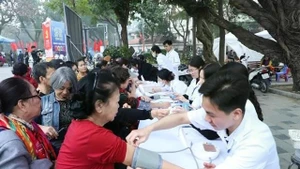Disguised promotional tools
In 2024 alone, the snack market in Viet Nam reached approximately 3.9 billion USD. The carbonated soft drinks market is also forecast to grow to around 2.5 billion USD by 2030. Processed foods such as instant noodles, frozen foods, and fast foods are considered lucrative segments for both domestic and international corporations. Extensive advertising and marketing campaigns have been launched across popular social media platforms such as YouTube and TikTok.
In reality, some products have been promoted with exaggerated claims. One such example is HIUP milk, which was misleadingly advertised to help children “grow 3 to 5 centimetres in height within three to six months”, causing confusion about product quality and directly affecting purchasing decisions made by parents.
Alarmingly, certain misleading products have even found their way into nutrition education activities at schools. A simple Google search reveals that some products that were previously involved in a variety of school-based social programmes across the country are now under review by regulatory authorities for issues relating to product quality declarations.
Accordingly, education experts argue that sponsorship and product promotion activities disguised as “community education” or “nutrition education” create a maze of information, making it difficult for both children and parents to distinguish between commercial advertising and genuine educational content. Numerous studies show that primary school-aged children are particularly susceptible to commercial messages that encourage the consumption of unhealthy foods.
Viet Nam already has a relatively strict legal framework in place to control the marketing of unhealthy foods targeting children. However, enforcement and monitoring must be strengthened to minimise negative impacts on children’s health and eating habits, particularly across all forms of media and within school environments.
CSR 2.0 and social role of enterprises
According to brand expert Le Quoc Vinh, “CSR today is evolving into a new model, referred to by researchers as CSR 2.0, which refers to an enterprise’s proactive, open, sincere and flexible engagement with social issues in which it can play a part.”
In the field of nutrition, CSR activities must go beyond statements and symbolic gestures. Instead, they should be demonstrated through clear and transparent commitments as well as meaningful and effective programmes that protect children’s health. Some businesses have already partnered with schools to build models for providing safe, healthy food directly to students, thereby contributing to improved awareness of clean and safe food practices right on school premises.
One notable example is the “Rise Viet Nam Milk Fund”, established in 2008, which has provided nearly two million cartons of milk to more than 21,000 disadvantaged children at 727 institutions nationwide. Over the years, Vinamilk — a founding partner of the fund — has been carrying out large-scale school CSR initiatives.
Another exemplary case is Ajinomoto Viet Nam’s School Meal Project. Launched in 2012, it is now being implemented in 62 out of 63 provinces and cities. Thousands of semi-boarding primary schools have adopted the programme, which includes provision of balanced meal menus through specialised software; nutrition education tools; and construction of “model canteens” based on the Japanese-style one-way kitchen model. As a result, over 1.4 million primary school students have received balanced meals and education on nutrition.
To expand the reach and impact of such positive initiatives, and to address existing shortcomings in the children’s food market, there must be stronger collaboration between regulatory agencies and the state in developing and enforcing clear, easy-to-understand nutrition labelling standards. This would help consumers make smart purchasing decisions. Additionally, violations of food safety and advertising regulations must be strictly punished to uphold deterrence and foster a fair and healthy competitive environment.
The responsibility of food businesses towards children’s health must be a genuine commitment, expressed through concrete and transparent actions that have a positive and lasting impact on the future of the next generation.
















